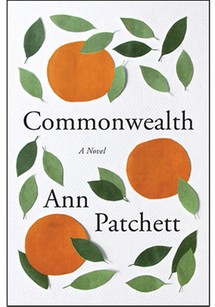Commonwealth, Ann Patchett's wonderful new novel, opens with a random occurrence that will ultimately shatter two families. It's a Sunday in 1960s Los Angeles. Fix Keating, a cop, and his wife, Beverly, are hosting a christening party. A latecomer shows up: Bert Cousins from the D.A.'s office, a man Fix barely knows and distinctly hasn't invited. The charming interloper carries a bottle of gin as a makeshift gift, and Fix finds himself pumping Bert's hand, welcoming him.
By day's end, Bert—who's barreled into a near stranger's party simply because he can't face being cooped up at home with his pregnant wife and three kids—has seduced Beverly. In this suburban American version of the Trojan War, two marriages will be destroyed, and Bert and Beverly's resulting union will disintegrate; one child of the reconstituted family will die needlessly, and the survivors will enter a lifelong struggle to mend the damage. Decades later, at the novel's conclusion, Franny, the child whose christening Bert crashed, watches the now-78-year-old Beverly—still beautiful, still blonde, married to her third husband—and realizes, "If her mother hadn't been so pretty none of it would have happened, but being pretty was nothing to blame her for." It is Patchett's gift to make us see the full cost of Franny's ambiguous forgiveness.
Patchett is a master storyteller whose talent for thrillerish suspense is combined with warm humor, moral generosity, and a curiosity about other worlds—earlier novels have been set, variously, in the Brazilian jungle, a South American vice president's mansion, and a home for unwed mothers in Kentucky. Unfolding in patrol cars, Chicago bars, and Virginia motels, Commonwealth doesn't venture as far afield. Yet Patchett's enduring theme remains: Ordinary people's kindness and grit can sometimes salvage catastrophes wrought by marauding egos.


